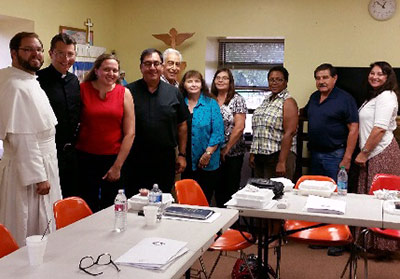Making the gospel tangible
Regional Council
What is the Regional Council Initiative?
The Regional Council Initiative is a process of community engagement that seeks to equitably and effectively connect under-resourced communities with the necessary capital to further the mission of the Gospel in the rural regions of the Archdiocese of Santa Fe.
Why was the Regional Council Initiative begun?
Rural communities in the Archdiocese of Santa Fe were significantly underrepresented in grant requests to the Foundation. The grants submitted by these communities were often not competitive in their presentation. Recognizing that there was significant need in these communities, and acknowledging that this need was largely unknown by the Foundation, a system of community-led grant review and program development was created. The goal was to ensure a more equitable assessment of grant requests from rural parishes as well as to reflect our faith’s commitment to a preferential option for the poor.
“I feel honored to be able to help the communities from which my ancestors came and passed on their faith to me.”
Patricia Trujillo-Oviedo
NW Regional Council Member
Who is on a Regional Council?
The Regional Councils consist of pastors and other individuals involved in parish ministry (parish staff, members of the parish council, members of particular ministries or outreach etc.). There Regional Council functions as an informal, though structured body with two primary goals:
- To act as an advisory and consultative body for the Catholic Foundation so that the Foundation may make the best funding allocations possible given limited resources.
- To discuss and promote the development of new initiatives to be funded. Neither the Regional Council itself, nor the Foundation manage initiatives to be funded.
The Council acts as a body that can initiate and spur action toward new ways of addressing challenges in parishes and across whole regions of the Archdiocese.
How does a Regional Council work?
The work of the Regional Councils is founded on four fundamental principles of Catholic Social Doctrine:
Preferential Option for the Poor: a primary starting point for the work of a Regional Council recognizing that the most vulnerable communities should have priority of access to limited resources.Subsidiarity those working most closely to the ground on pastoral initiatives are seen as those most capable of determining community needs and designing and implementing initiatives to be funded.
Subsidiarity: those working most closely to the ground on pastoral initiatives are seen as those most capable of determining community needs and designing and implementing initiatives to be funded.
Solidarity: institutions of means and influence stand to empower members of local communities through funding support, and technical assistance and neighboring communities become more in tune with their mutual challenges and complementary strengths.
Integral Human Development: addresses the complexity of interconnected needs and strengths of a community and sees that change in any one part of a community has impacts across the community.
As Regional Councils grow in strength and engagement, it is hoped that they will begin to undertake comprehensive assessments of their regions’ needs and develop collaborative solutions to be funded by the Foundation and other larger funding bodies. This requires a systematic analysis of all community resources, strengths, needs, and challenges in light of Gospel values. This may result in new initiatives that are able to draw from community strengths in addressing other community weaknesses.

